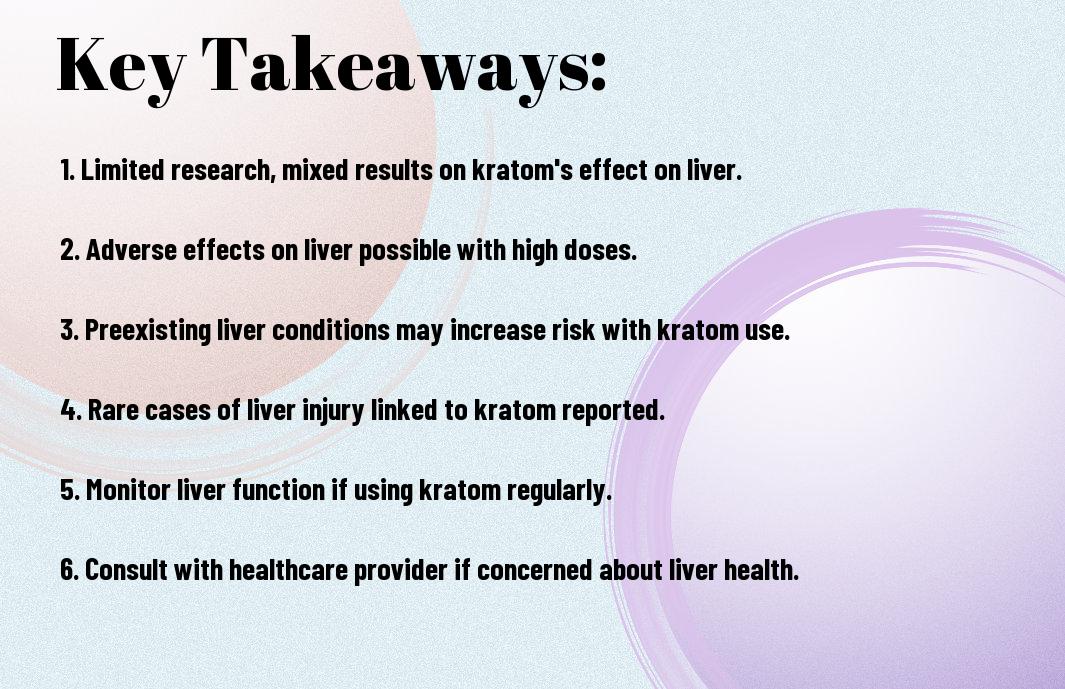In terms of determining if kratom is hard on the liver, it’s important to understand the potential effects this herbal supplement may have on your body. Your liver plays a crucial role in filtering toxins and metabolizing substances, so it’s natural to wonder about the impact of kratom consumption. In this blog post, we will probe into the research and discuss the relationship between kratom use and liver health, providing you with the information you need to make informed decisions about your well-being.

What is Kratom?
A popular herbal supplement, Kratom comes from the leaves of the Mitragyna speciosa tree, native to Southeast Asia. These tropical evergreen trees are commonly found in countries like Indonesia, Thailand, Malaysia, and Papua New Guinea. The leaves of the Kratom tree have been used for centuries in traditional medicine practices.
Origin and History
Kratom has a long history of use in Southeast Asia, where it has been consumed for its stimulant and pain-relieving effects. Workers in these regions would chew on the leaves to help increase energy and endurance during long days of labor in the fields. It has also been utilized in traditional ceremonies and cultural practices.
Chemical Composition
On a chemical level, Kratom contains two main compounds: mitragynine and 7-hydroxymitragynine. These alkaloids are responsible for the effects that Kratom produces on the body. Mitragynine acts as a stimulant in low doses, while 7-hydroxymitragynine has more sedative properties.
How Does Kratom Affect the Liver?
While kratom is known for its various effects on the body, you may wonder how it specifically impacts the liver. Understanding the relationship between kratom and the liver is crucial in determining whether it is hard on this vital organ.
Metabolism and Processing
Metabolism plays a significant role in how kratom affects the liver. When you ingest kratom, it undergoes metabolism in the liver, where enzymes break it down. The processed compounds are then released into the bloodstream, where they exert their effects throughout the body. This process can put a strain on the liver, especially with regular or high doses of kratom.
Potential Strains on Liver Function
To understand the potential strains that kratom can put on liver function, you need to consider factors such as dosage, frequency of use, and individual differences in metabolism. High doses of kratom or frequent use may overwhelm the liver’s processing capabilities, leading to possible liver damage or dysfunction. Additionally, individuals with pre-existing liver conditions may be more susceptible to adverse effects from kratom.
Liver health is crucial for overall well-being, as this organ is responsible for detoxifying the body and metabolizing substances like kratom. Monitoring your kratom intake and being aware of any signs of liver distress, such as abdominal pain, yellowing of the skin, or dark urine, is crucial in safeguarding your liver health while using kratom.
The Science Behind Kratom’s Impact
Studies on Liver Enzymes
Not all studies indicate that kratom is hard on the liver. Research has shown that kratom use, even at high doses, does not have a significant impact on liver enzymes. In fact, a study published in the journal Drug and Alcohol Dependence found that kratom users did not show any signs of liver toxicity or damage in their liver enzyme levels.
Research on Liver Damage
Any potential risk of liver damage from kratom remains controversial. While some studies have suggested a link between kratom use and liver injury, the evidence is still inconclusive. More research is needed to fully understand the relationship between kratom consumption and liver health.
Science is still exploring the complex interactions between kratom and the liver. It’s important to stay informed about the latest research findings and consult with healthcare professionals if you have any concerns about your liver health while using kratom.

Risks and Side Effects
Your How Hard Is Kratom On The Liver? Damage And … health should always be a top priority when considering any substance. While kratom is generally considered safe for most people when used in moderation, there are some risks and side effects to be aware of.
Common Adverse Reactions
Risks of using kratom include common adverse reactions such as nausea, constipation, vomiting, and dizziness. These side effects are usually mild and can often be managed by adjusting the dosage or frequency of kratom use. It is imperative to listen to your body and pay attention to any discomfort you may experience while using kratom.
Rare but Serious Complications
On rare occasions, there have been reports of more serious complications associated with kratom use. These can include liver toxicity, seizures, and even death in extreme cases. It is crucial to be aware of these potential risks and to monitor your health closely if you choose to use kratom. If you experience any concerning symptoms, it is imperative to seek medical attention immediately.
Factors That Increase Liver Risk
All kratom users should be aware of the factors that can increase the risk of liver damage when using this herbal supplement. Here are some important considerations to keep in mind:
- Dosage and Frequency
- Individual Sensitivity and Health Status
Dosage and Frequency
One crucial factor that can increase the risk of liver damage from kratom is the dosage and frequency of use. Taking high doses of kratom frequently can put additional strain on your liver, potentially leading to adverse effects over time. It is vital to follow recommended dosage guidelines and not exceed the suggested amount to help protect your liver health.
Individual Sensitivity and Health Status
For some individuals, factors such as genetics, overall health status, and underlying medical conditions can play a significant role in how their liver processes kratom. If you have a history of liver problems or sensitivities, you may be at a higher risk of experiencing liver issues when using kratom. It is crucial to consult with a healthcare provider before incorporating kratom into your routine if you have any liver concerns.
Risk: Recognizing your individual sensitivity and health status can help you make informed decisions about using kratom and protect your liver health in the long run.
Mitigating the Risks
Safe Usage Guidelines
After considering the potential impact of kratom on your liver health, it’s important to establish safe usage guidelines to mitigate any risks. To minimize the strain on your liver, it’s crucial to dose kratom responsibly and avoid excessive consumption. By sticking to recommended doses and giving your liver breaks between doses, you can help lessen the burden on your liver.
Combining Kratom with Liver-Friendly Supplements
Mitigating the risks associated with kratom and liver health can also involve combining kratom with liver-friendly supplements. Certain supplements, such as milk thistle, N-acetylcysteine (NAC), and turmeric, are known for their liver-protective properties. By incorporating these supplements into your routine while using kratom, you may provide additional support to your liver and help counteract any potential negative effects.
Supplements like milk thistle contain active ingredients that can help promote liver health and protect against damage. When taken alongside kratom, these supplements may offer a synergistic effect, bolstering your liver’s ability to process substances effectively and maintain optimal function.
Conclusion
With these considerations in mind, it is crucial to be aware of the potential adverse effects of kratom on the liver. While there is still ongoing research to fully understand the impact of kratom on liver health, it is crucial to approach its consumption with caution. Monitoring your kratom intake, being aware of any changes in your liver function, and consulting with a healthcare professional are important steps to safeguard your liver health.
Note, your liver plays a vital role in your overall well-being, and taking proactive measures to protect it is crucial. Stay informed, stay vigilant, and prioritize your health when considering the use of kratom or any supplement that may impact liver function. Your liver will thank you for the care and attention you provide.
Q: Is kratom hard on the liver?
A: Research on the effects of kratom on the liver is limited and mixed. Some studies suggest that high doses of kratom may lead to liver damage, while others show no significant adverse effects on the liver.
Q: What are the signs of liver damage from kratom?
A: Symptoms of liver damage from kratom may include nausea, itching, dark urine, abdominal pain, jaundice, and fatigue. It is important to consult a healthcare provider if you experience any of these symptoms.
Q: How can I reduce the risk of liver damage from kratom?
A: To reduce the risk of liver damage from kratom, it is advisable to use it in moderation, avoid consuming high doses, and monitor your liver function regularly if you are a regular kratom user.
Q: Can pre-existing liver conditions worsen with kratom use?
A: Individuals with pre-existing liver conditions should exercise caution when using kratom, as it may exacerbate liver damage in some cases. It is advisable to consult a healthcare provider before using kratom if you have liver issues.
Q: Are there any safer alternatives to kratom for pain management?
A: Yes, there are several alternative options for pain management that are considered safer than kratom, such as over-the-counter pain relievers, physical therapy, acupuncture, and CBD products. It is recommended to consult a healthcare provider for personalized recommendations.
Q: Can kratom interact with medications that affect liver function?
A: Yes, kratom may interact with medications that affect liver function, potentially increasing the risk of liver damage. It is important to inform your healthcare provider about any kratom use if you are taking medications that impact liver health.
Q: Is kratom banned in any countries due to its potential effects on the liver?
A: While kratom is legal in many countries, it is banned in several others due to concerns about its potential harmful effects, including on liver health. It is vital to research the legality of kratom in your region before using it.









